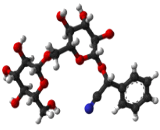Amygdalin is a glycoside initially isolated from the seeds of the tree Prunus dulcis, also known as bitter almonds, by Pierre-Jean Robiquet and A. F. Boutron-Charlard in 1830, and subsequently investigated by Liebig and Wöhler in 1830. Several other related species in the genus of Prunus, including apricot and black cherry , also contain amygdalin. Since the early 1950s, a modified form of amygdalin has been promoted under the names laetrile and "Vitamin B17" as a cancer cure, but studies have found it to be ineffective and potentially toxic. Amygdalin is sometimes confused with laevomandelonitrile, also called laetrile for short; however, amygdalin and laetrile are different chemical compounds. Laetrile, which was patented in the United States, is a semi-synthetic molecule sharing part of the amygdalin structure, while the "laetrile" made in Mexico is usually amygdalin, the natural product obtained from crushed apricot pits, or neoamygdalin.

